Welcome to the Seawall’s semi-annual poetry feature. This season, twelve poets write briefly on some of their favorite new and recent titles. This multi-poet/title feature is posted here in April and November. The commentary includes:
Brian Teare
on Caribou by Charles Wright (Farrar Straus Giroux)
Catherine Barnett
on Headwaters by Ellen Bryant Voigt (Norton)
Sally Ball
on Trances of the Blast by Mary Ruefle (Wave Books)
Kevin Prufer
on All You Do is Perceive by Joy Katz (Four Way Books)
Gregory Pardlo
on Hum by Jamaal May (Alice James Books)
Lisa Russ Spaar
on The Tulip-Flame by Chloe Honum (Cleveland State University Press)
Katie Peterson
on A Table That Goes On For Miles by Stefania Heim (Switchback Books)
Zach Savich
on Peace by Gillian Conoley (Omnidawn Publishing)
David Wojahn
on Collected Poems by Ron Padgett (Coffee House Press)
Elaine Sexton
on Chopper! Chopper! Poetry From Bordered Lives by Veronica Reyes (Arktoi Books/Red Hen Press)
Chloe Honum
on The Consolations by John W. Evans (Trio House Press)
Leah Umansky
on Into the Dark & Emptying Field by Rachel McKibbens (Small Doggies Press)
* * * * * * * * * * * * * * * * * * * * * * * * * * * * * * * * * * * * * * * * * * * * * *
Brian Teare
Caribou by Charles Wright (Farrar Straus & Giroux)
Lyric poets tend to make fetishes of form, mode, and mood. With fetish, I mean to reach down to the word’s Latin root, factīcius, which means “made by art,” and to invoke the idea that lyric poets often return to aspects of their practice that for them draw power of unusual potency out of artifice. Sometimes these fetishes last for a career — Dickinson’s signature interrupted quatrains, for example, or Trakl’s melancholic blue and brown landscapes — and sometimes they shift dramatically or subtly as the poet ages into writing and life.
 For metaphysical poets, such fetishes often take on the additional feel and sheen of tools used in necessary rituals, each poem another attempt at prayer, insight, ecstasy, or spiritual balance. Charles Wright is, of course, one such poet, and his most recent volume, Caribou, continues the form, mode, and general mood of what he has called his late style — while also allowing the poems to take lateness itself as both subject and predicament.
For metaphysical poets, such fetishes often take on the additional feel and sheen of tools used in necessary rituals, each poem another attempt at prayer, insight, ecstasy, or spiritual balance. Charles Wright is, of course, one such poet, and his most recent volume, Caribou, continues the form, mode, and general mood of what he has called his late style — while also allowing the poems to take lateness itself as both subject and predicament.
These characteristic meditations on landscape, metaphysics, language, and the limits of consciousness most often begin at evening, Wright’s speaker looking out over a landscape as likely to be his Virginia backyard as the Montana landscape outside his cabin. Segueing from description to rhetoric, these lyrics move from quotidian detail to vatic pronouncement and back again, shifts calmly orchestrated by Wright’s trademark terraced, dropped lines measured out by syllable count. “It is a good-looking evening, stomped and chained,” he begins “History is a Burning Chariot,”
It is a grace to be a watcher on such a scene.
So balance me with these words—
Have I said them before, I have,
have I said them the same way, I have,
Will I say them again, who knows
what darkness snips at our hearts.
And though his otherwise sober voice has long been able to shade into self-effacing and self-referential wit, such gestures imbue these poems — so concerned with mortality — with a particularly poignant lateness of the kind Edward Said describes in On Late Style: “lateness includes the idea that one cannot really go beyond lateness at all, cannot transcend or lift oneself out of lateness, but can only deepen the lateness.” I’d add that a cannily self-aware artist sees such lateness not only as inevitable endgame but also as a point-of-view from which to comment on lifelong ambitions, their lateness a perspective enlarged by looking back. Thus the repetitions of Wright’s longstanding formal and modal fetishes are given the new feel of having been being in time. “So long,” Wright declares in “Ancient of Days,”
This an old man’s poetry,
written by someone who’s spent his life
Looking for one truth.
Sorry, pal, there isn’t one.
The vernacular sucker-punch of that last line — a shock admittedly softened and qualified by subsequent lines — nonetheless gathers force as the book lands similar jabs throughout. These gestures define knowledge through a deepening negation that itself seems a product of lateness, of close proximity to the mortal. “Is this the hour of our undoing?” ends “Plain Song,” “If so we are perfected.” Fittingly, this unsparing attitude goes on to produce some of the most arresting closures in Caribou. Take, for example, the final stanzas of “Little Elegy for an Old Friend”:
Sorrow, come pass me from hand to hand.
Time to reset eternity’s clock
To the far side of midnight.
Time to remember the unremembered, and the forgotten.
Time to release them, and give them up.
There is no balm, my man,
not even in Gilead.
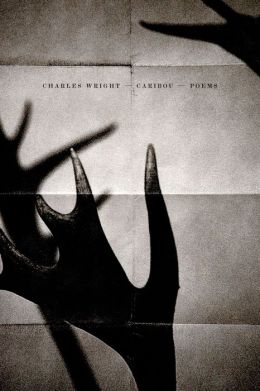 Here and throughout Caribou, Wright’s usually unflappable metaphysician articulates an existential situation that challenges the efficacy and power of his customary fetishes. What power, after all, does poetry have over death? Wright has long positioned his poetics on a pivot between a loosely interpreted Buddhism and a homespun apophatic Christianity: he’s zeroed in on the moment in both traditions where mind is released from consciousness of itself and voids out, freed to perceive what is. To achieve this release requires meditative discipline and ritual repetition, of course, but neither guarantees success, particularly when mortality is on one’s mind. Those poems in which Wright’s characteristic equanimity and detachment fail are particularly moving because they indicate a limit in the fetish’s power to protect the poet. In the middle of “Dude,” in particular, we witness the speaker fall in thrall to obsessive thoughts:
Here and throughout Caribou, Wright’s usually unflappable metaphysician articulates an existential situation that challenges the efficacy and power of his customary fetishes. What power, after all, does poetry have over death? Wright has long positioned his poetics on a pivot between a loosely interpreted Buddhism and a homespun apophatic Christianity: he’s zeroed in on the moment in both traditions where mind is released from consciousness of itself and voids out, freed to perceive what is. To achieve this release requires meditative discipline and ritual repetition, of course, but neither guarantees success, particularly when mortality is on one’s mind. Those poems in which Wright’s characteristic equanimity and detachment fail are particularly moving because they indicate a limit in the fetish’s power to protect the poet. In the middle of “Dude,” in particular, we witness the speaker fall in thrall to obsessive thoughts:
The dog gets sick. The dog runs away.
You’ve got your mind on transubstantiation.
The dog
Runs away. The dog gets sick, the son calls to tell you
That he’s been fired.
You’ve got your mind on transubstantiation.
The world’s a mass of cold spaghetti.
The dog runs away, your mind’s still on transubstantiation.
The dog’s gone missing, the dog comes back.
The same dog, but a different dog,
in different weather.
The droop-bellied dark clouds loom
And suck up their forks of light
and the dog goes missing
A second time, and who can blame him?
If he disappears again, your mind’s back on transubstantiation.
Spread out over individual poems, over books, over decades, Wright’s habitual return to forms, modes, and moods has created an aura of calm mastery, but the speed with which he here returns to phrasal repetitions produces desperation instead. This passage reminds us that Wright’s control over poetic form has, in fact, always enacted its own forms of transubstantiation. “The metaphysics of the quotidian is what he was after,” begins 2009’s Sestets, “A little dew on the sunrise grass,/A drop of blood in the evening trees,/A drop of fire.” But in Wright’s late late style, transubstantiation stubbornly remains a polysyllabic word; the dog that dogs the speaker remains sick, or lost, or sick and lost, and leaves nothing in its wake but that word, which changes nothing. This failure introduces a brave new blue note in an otherwise familiar music, altering the whole of Wright’s oeuvre by heightening and further dramatizing the doubt that has always been an integral part of Wright’s faith. It is a profound development in an already profound body of work. “We live beyond the metaphysician’s fingertips,” “Dude” continues,
It’s sad, dude, so sad.
There is no metaphor, there is no simile,
and there is no rhetoric
To nudge us to their caress.
[Published March 18, 2014. 82 pages, $24.00 hardcover]
Brian Teare
has published four collections of poetry, most recently Companion Grasses (Omnidawn, 2013), a finalist for both the Kingsley Tufts Poetry and Lambda Literary awards. He is an assistant professor at Temple University.
* * * * * * * * * * * * * * * * * * * * * * * * * * * * * * * * * * * * * * * * * * * * * *
Catherine Barnett
Headwaters by Ellen Bryant Voigt (Norton)
Ellen Bryant Voigt was my teacher in graduate school and among the many, many things I learned from her none is more important than her celebration of the tension between order and chaos. I have always loved Voigt’s work, especially Shadow of Heaven and the new poems in Messenger, but I am moved beyond words when I open Headwaters. Even were it not such a stunning departure from — and deepening of — her earlier work, I would marvel at the way the poems introduce us to a speaker who is simultaneously losing and desperately striving to maintain control; it is clear that in the rush of syntax and song that propels these poems the battles against time, annihilation, regret, loneliness are not, no matter how much the speaker can “deduce” the birds in her yard, to be won.
Mortality is everywhere in this book, as well as the failure of the mind to change that fact. The speaker believes she should be able to think her way out of our predicaments: out of the harm looking in the window at her daughter’s naked body; out of the accidental shooting by a husband of a wife; out of a boy’s suicide; out of her beloved’s “you got sick you got well you got sick.” But this mind, though alert and at work and turned on high, cannot right these wrongs, and is bewildered: “what I heard was less a call than a cry // a fragment repeating repeating a kind of shudder,” Voigt writes in “Owl”:
in the Medicine Wheel
the emblem for wisdom is the same for gratitude at dusk at dark
the farsighted owl strikes in utter silence when we hear it
from the tree or the barn what it announces
is already finished
 Ok yes, some of the racing of my heart is induced by Voigt’s relinquishing of punctuation, her stuttering repetitions, and the radical extension of line: the combination of these formal choices causes breathlessness, panic, dread, desire, every kind of timelessness. Even as there is an apparent loosening of the rules, other invisible guidewires (exquisite pacing, patterns of negation, gorgeous music) are in place to keep us from falling into chaos and confusion. The long lines threaten to crumble or knot themselves up in poem after poem; that formal battle parallels the threat faced by the speaker (and by the spoken-to). Animating these inimitable poems is love. Fierce love; underground love; the act of making: “my job was children food house the rest of what I did stayed underground.”
Ok yes, some of the racing of my heart is induced by Voigt’s relinquishing of punctuation, her stuttering repetitions, and the radical extension of line: the combination of these formal choices causes breathlessness, panic, dread, desire, every kind of timelessness. Even as there is an apparent loosening of the rules, other invisible guidewires (exquisite pacing, patterns of negation, gorgeous music) are in place to keep us from falling into chaos and confusion. The long lines threaten to crumble or knot themselves up in poem after poem; that formal battle parallels the threat faced by the speaker (and by the spoken-to). Animating these inimitable poems is love. Fierce love; underground love; the act of making: “my job was children food house the rest of what I did stayed underground.”
Once I dreamed that Ellen advised me to go to law school where, of course, logic and analysis and the arts of persuasion are paramount. I am the daughter of a law professor and in these poems I recognize the insistence of logic bumping up against feeling. Logic cedes way: “sad hound look up,” she writes in one of several poems that seems to work as a kind of ars poetica: “since thought is prayer if hard and true I thought that thought / could lead me to compassion.” What I love so much in these poems is the losing battle Voigt engages in and witnesses and fights against and laments and praises. I, too, am one who believes I can figure anything out if only I think hard enough, a practice I learned from my father who could pack a family of seven into one station wagon with a summer’s worth of camping equipment and gin. I think, therefore I am, says Descartes, and throughout her amazing career Voigt has in many ways been a Cartesian poet, a rationalist. Here, too, perhaps she is Cartesian, but thinking is now in mortal danger, and losing, and the speaker knows it: “I was left on my own to study the graveyard.”
“No is the wildest word we consign to language,” wrote Emily Dickinson, a claim that makes itself felt in Headwaters. For example, the title poem, which opens the book with the admission “I made a large mistake,” is filled with negation as a way to know — to “no” — the world: “no tracks in the snow no boot pointed toward me or away / no snow as in my dooryard only the many currents of self-doubt.” This pattern of three consecutive no’s recurs throughout the book and suggests a kind of via negativa, a mind trying to deduce some truths from the natural world — as often from what isn’t there as from what is. At the same time, this “no … no … no” functions as protest, as resistance, as pure song.
 Throughout the book, music expresses both chaos and order. “Headwaters” might be a kind of “buried” sonnet — seven long lines (most about 20 syllables each) with a turn at the seventh: “but don’t you think I’m doing better in this regard I try to do better.” The closing “couplet,” housed in this one long line, uses the repetition of “better” for its rhyme. The turn here is heartbreaking because there is no argument, only pleading and a promise. We know we’re in for a journey — we’re starting at the place where all rivers and thinking begin — at the “headwaters”: will the speaker tell us what the mistake was? where will the river take her, and her readers? what is the journey? will she be able to “do better” and make amends? has she?
Throughout the book, music expresses both chaos and order. “Headwaters” might be a kind of “buried” sonnet — seven long lines (most about 20 syllables each) with a turn at the seventh: “but don’t you think I’m doing better in this regard I try to do better.” The closing “couplet,” housed in this one long line, uses the repetition of “better” for its rhyme. The turn here is heartbreaking because there is no argument, only pleading and a promise. We know we’re in for a journey — we’re starting at the place where all rivers and thinking begin — at the “headwaters”: will the speaker tell us what the mistake was? where will the river take her, and her readers? what is the journey? will she be able to “do better” and make amends? has she?
HEADWATERS
I made a large mistake I left my house I went into the world it was not
the most perilous hostile part but I couldn’t tell among the people there
who needed what no tracks in the snow no boot pointed toward me or away
no snow as in my dooryard only the many currents of self-doubt I clung
to my own life raft I had room on it for only me you’re not surprised
it grew smaller and smaller or maybe I grew larger and heavier
but don’t you think I’m doing better in this regard I try to do better
What is the speaker’s “large mistake”? Perhaps it’s her overwhelming faith in thinking, a lament/prayer that drives many of the poems. In “Bear,” for example, one of the members of the couple speaks of the electric fence, “thinks / the bear can hear it hum from the edge of the woods” while, as if a wholly different species,
the other one thinks
the plural pronoun is a dangerous fiction the source
of so much unexpected loneliness
How does the poem move from a meditation on a bear to the deep existential loneliness named there at the end? Through wildly, assiduously, impossibly tracking the mind at work. Although thinking doesn’t cure anything, really, in these poems, it is the repeated strategy favored by a speaker who is also at times wry, funny, self-deprecating: “I like distinctive hats on those in charge,” she says in “Birch.” The humor is essential here and throughout, as are the moments of nursery rhyme and ditty.
I don’t believe Voigt “chose” to write these poems this way — it feels as if they wrote her and she recorded them as she was tumbling downriver, down the mind’s river, time’s river, into an ocean of uncontainable measureless feeling. The faculties of thinking and judging have been transmuted — harnessed, catalyzed, converted, alchemized — into faculties of feeling: “a moral sense / is exhausting,” she writes:
… I am exhausted a coma looks good to me
if only I could be sure there’d still be dreams it’s what I miss the most
even in terrible dreams at least you feel what you feel not what
you’re supposed to feel
This gorgeous poem, “Sleep,” ends with “the brief bright flames of human will” endangered by the gods who
lean from their couches yes more fear and dread for that one
yes let’s turn the suffering up a notch let’s watch her
strike the match I strike it now when I wake
in the dark I light that little fire
[Published October 21, 2013. 64 pages, $24.95 hardcover. Paperback edition due December 2014]
Catherine Barnett
is the author of The Game of Boxes (Graywolf, 2012, winner of the James Laughlin Award) and Into Perfect Spheres Such Holes Are Pierced (Alice James, 2004). Her honors include a Whiting Writer’s Award and a Guggenheim Fellowship.
* * * * * * * * * * * * * * * * * * * * * * * * * * * * * * * * * * * * * * * * * * * * * *
Sally Ball
Trances of the Blast by Mary Ruefle (Wave Books)
To love life while not being optimistic, to embrace the world but not romanticize it: Mary Ruefle’s poems operate in what ought to be a narrow territory. But it’s not narrow, this zone between wishful thinking and recognition of earth’s terms, this zone where all manner of baldly terrible things coincide with loveliness, and where it’s possible to say:
I hate childhood
I hate adulthood
And I love being alive
Or:
My happiness is marred only
by my failure to attain it.
Or:
I’m on a fifer’s ride
My steed is black and steady
I say goodnight to everyone
to everyone goodmorn
Because morning unfailingly comes, and so: Goodmorn. In “On Velvet Turf,” Ruefle writes, “I dash outdoors so I will know / a little more about the day,” and this seems a fair ars poetica for Trances of the Blast: that energetic dashing, curiosity, thirst for — and belief in — knowledge. “I stride forth filled with the whiff.” It’s ephemeral, a whiff of knowledge, but it’s enough to fill a stride, enough to keep us striding wherever the day may fling the mind.
 As I read this book, I was also reading Duplex by Kathryn Davis, and I’m struck by a similarity in these two: absolute composure in the face of what would startle most of us, a capacity therefore to see the unseeable core of things in vivid and unflinching detail. This sends Davis into a stranger and stranger recasting of reality into the metaphors we often use for it (the handsome man really is a sorcerer, the perfect family next door really are robots … everybody knows this; and there are actual scows in the sky watching over all we do…) and it causes Ruefle, too, to inhabit metaphor rather than adorn her poems with it. Ruefle’s speakers, with their unflappable wide-open minds, seem to test and then duck away from whimsy; they are drawn to metaphor as a means to enter a deeper proximity to the things of the world. In “Calm, How Darest Thou Wait,” the happy-looking flowers that have prompted the poem “are not questions left howling / because their owner has died/ … they do not engage a private tutor/ … they are not innumerable birds/… they do not distinguish/ between the general wreckage and the singular wreckage/ They are not…/ they are not…/ they are not….” Finally the poem closes:
As I read this book, I was also reading Duplex by Kathryn Davis, and I’m struck by a similarity in these two: absolute composure in the face of what would startle most of us, a capacity therefore to see the unseeable core of things in vivid and unflinching detail. This sends Davis into a stranger and stranger recasting of reality into the metaphors we often use for it (the handsome man really is a sorcerer, the perfect family next door really are robots … everybody knows this; and there are actual scows in the sky watching over all we do…) and it causes Ruefle, too, to inhabit metaphor rather than adorn her poems with it. Ruefle’s speakers, with their unflappable wide-open minds, seem to test and then duck away from whimsy; they are drawn to metaphor as a means to enter a deeper proximity to the things of the world. In “Calm, How Darest Thou Wait,” the happy-looking flowers that have prompted the poem “are not questions left howling / because their owner has died/ … they do not engage a private tutor/ … they are not innumerable birds/… they do not distinguish/ between the general wreckage and the singular wreckage/ They are not…/ they are not…/ they are not….” Finally the poem closes:
They just stand next to each other
in the churchyard silence
and from time to time
help the rain
by listening to it.
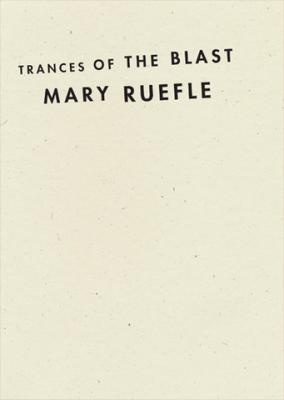 The metaphor that stands is the sparest one, the one that seems to crave such listening itself, and the others, conceived in the negative, hover behind, rejected not as figures but as figures here, as interpretations of these flowers, now. In a later poem she writes, “I’m not making any comparisons, / that’s just the way things are—” which is another way of claiming a particular metaphor as an increase of intimacy rather than an outward turn. Of course, it’s also true that those rejected metaphors do adorn the poem, flowers as questions and tutors and birds: the book is full of such zing. As we read, we follow the sine curve of Ruefle’s movement between the voracious dashing out and the occasions when, having dashed, the speaker achieves access to calm: “a river of tenderness entered my heart.” Such figures become the means by which Ruefle’s willful (or helpless?!) appreciation of the difficult world (that love despite that infuses the collection) fixes itself to the page. Here is the title poem:
The metaphor that stands is the sparest one, the one that seems to crave such listening itself, and the others, conceived in the negative, hover behind, rejected not as figures but as figures here, as interpretations of these flowers, now. In a later poem she writes, “I’m not making any comparisons, / that’s just the way things are—” which is another way of claiming a particular metaphor as an increase of intimacy rather than an outward turn. Of course, it’s also true that those rejected metaphors do adorn the poem, flowers as questions and tutors and birds: the book is full of such zing. As we read, we follow the sine curve of Ruefle’s movement between the voracious dashing out and the occasions when, having dashed, the speaker achieves access to calm: “a river of tenderness entered my heart.” Such figures become the means by which Ruefle’s willful (or helpless?!) appreciation of the difficult world (that love despite that infuses the collection) fixes itself to the page. Here is the title poem:
TRANCES OF THE BLAST
Alarming brightness of yellow speech
Transparency of all hearts
Everyone I know is in a speck of danger
The head is in the blood
What is the code for happiness?
Blackberries forever
At one time
Now it is another time
How near we were to having thoughts
How near we are today
Whole words, ashamed, apart, by themselves, transfigured
And if by chance that makes you happy
Explain yourself or vanish
After four lines that lean on metaphor (and that refuse to be parsed — fragment metaphors! — even though we want them to yield, even though we expect a title poem to explain itself, to explain more than itself …), after all that, the speaker asks, “What is the code for happiness?” And one wonders: is that the problem, believing there’s a code? She’s looking for it, and then she turns to us, seeming to say, If my observation has made you happy, then the code is fulfilled, and you should be able to explain it to me. In “With Love and Disregard,” Ruefle is on her way out of this (deftly ordered, unrelentingly ordered) book, and like Keats she’s “earnest and capable of grasping,” but her hand isn’t quite as scary as his. In fact, she writes, “if ever you wish to call out / my summons is seven zeros, plus one / for the Operator.” Maybe the code for happiness is to dial her up: to let her help by listening: 0-000-0000—
[Published October 1, 2013. 136 pages, $22.00 hardcover. Paperback edition due September 2014]
Sally Ball
is the author of Wreck Me and Annus Mirabilis, both from Barrow Street Press. She’s an associate director of Four Way Books, and she teaches in the MFA program at Arizona State University in Tempe.
* * * * * * * * * * * * * * * * * * * * * * * * * * * * * * * * * * * * * * * * * * * * *
Kevin Prufer
All You Do is Perceive by Joy Katz (Four Way Books)
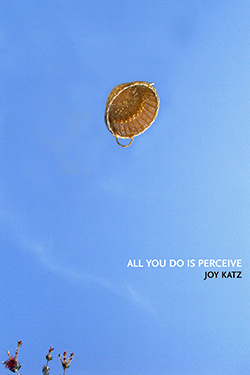 One of the delights of reading great poetry is that feeling of having escaped oneself, of entering a mind far more intricate and interesting than one’s own. Emily Dickinson’s poems don’t speak casually, like a dull friend over dinner, nor, despite their metered architecture, do they announce themselves formally. Rather, they enact the movements of a thinking, feeling mind, one that wrestles with, but will not answer, an ultimately unsolvable problem. What, she asks, is the nature of God? What is it like not to exist? We feel her poems hesitate at the dashes or in the white space between stanzas, then move onward into double mindedness, complexity, ambivalence, and terror.
One of the delights of reading great poetry is that feeling of having escaped oneself, of entering a mind far more intricate and interesting than one’s own. Emily Dickinson’s poems don’t speak casually, like a dull friend over dinner, nor, despite their metered architecture, do they announce themselves formally. Rather, they enact the movements of a thinking, feeling mind, one that wrestles with, but will not answer, an ultimately unsolvable problem. What, she asks, is the nature of God? What is it like not to exist? We feel her poems hesitate at the dashes or in the white space between stanzas, then move onward into double mindedness, complexity, ambivalence, and terror.
Although her subject matter is different, Joy Katz has always been such a poet, and the lovely, unsettling experience of reading her new book, All You Do Is Perceive, is primarily intimate, her speakers revealing themselves slowly as ambivalent, frightened, thinking characters alive in a world in which the enormity of our recent history and the more personal terrors of parenthood exist as simultaneous and powerful forces.
“Rescue Song” begins with a mother reading to her son from Richard Scarry’s What Do People Do All Day, describing a picture of a fireman rescuing a little boy from a burning building. “Tell me again,” the boy says, but the poem’s mind is elsewhere, the speaker growing increasingly unnerved —
I was in yoga when
people held hands and fell out of burning buildings downtown.
Commuters caught them on the small screens of their phones
tucked them into breast pockets and walked home.
Om.
What’s happening, Mama? A nuclear accident (don’t react)
being narrated on the radio, in Japanese.
A woman’s voice like one of those paper flowers that blooms in water.
The poem hurries along in a frightened present tense, one thought cutting off another, interrupted now and then by some hint of the child’s presence, until all at once we discover that the poem has always been about mortality, the need of the mother to protect the child against a chaotic, overwhelming world. “Location: our street in Brooklyn,” Katz writes,
where, having dropped him
(as a baby) under a cab, I pray the driver will run over me, too.
He will, he is a father, he understands —
Keep breathing.
The ambulance dazzles like a cocktail ring.
My boy leaps into the net on page 23.
Elsewhere Katz looks over ordinary items — a plate of tomatoes, a jam pot, a lettuce bag — and sees in them a strange vitality, a reflection of the speaker’s own uneasy mind. In “Packing Tape,” Katz considers the human relationship between a box (which contains “some fragile thing afloat in paper,” a soul? a mind?) and the tape that both conceals and secures its contents:
With the first pull the roll makes a hurt growl. Strap the long sides fast and the tape sounds like fish slapping a deck. Ease the last inches round the edge, hear the child-hands patting wet sand. The roll’s spaniel teeth bite off any length with mean precision …
… A hundred cartons, sealed thusly, gleam in moving vans — the sole glamour of packing tape being its shine, slick as lip gloss on a teenage daughter.
 Of course, so much of the delight of Katz’s poems is that sense of immediacy, of the simultaneity of her and our feelings, the surprise and delight of a sudden deeply human thought arising from the chaos of perception. And the insights here are forceful and frightening. Midway through a loving and beautiful description of a child playing with a cardboard box, during which he “will bubble and tree and ha and silence,” a more sinister thought intrudes. The mother is no longer a passive observer of her child’s pleasure, but a consumer of it: “Now,” Katz writes, “she must daily use the baby to feel this feeling: a needle afloat on plain water…. Is she blameless? Is the box a form of love?”
Of course, so much of the delight of Katz’s poems is that sense of immediacy, of the simultaneity of her and our feelings, the surprise and delight of a sudden deeply human thought arising from the chaos of perception. And the insights here are forceful and frightening. Midway through a loving and beautiful description of a child playing with a cardboard box, during which he “will bubble and tree and ha and silence,” a more sinister thought intrudes. The mother is no longer a passive observer of her child’s pleasure, but a consumer of it: “Now,” Katz writes, “she must daily use the baby to feel this feeling: a needle afloat on plain water…. Is she blameless? Is the box a form of love?”
Anyone will find in Joy Katz’s poems sources of intellectual pleasure and meaning—and this, in itself, is a reason to recommend it. Another reason is much simpler: Joy Katz writes with astonishing beauty. Two lovers, side by side, look up from their menus, their faces “like sails struck by the sun.” A mother observes her child: “He is smiling. / Happiness is on me like a scratch in a car door.” The sound of a baby tearing pages from a book is “soft and thin, like falling asleep.”
[Published October 1, 2013. 84 pages, $15.95 paperback]
Kevin Prufer’s
sixth book of poems is Churches (Four Way Books). He is a Professor of English in the Creative Writing Program at the University of Houston.
* * * * * * * * * * * * * * * * * * * * * * * * * * * * * * * * * * * * * * * * * * * * *
Gregory Pardlo
Hum by Jamaal May (Alice James Books)
More ruminative and lyrical than embracing and panoramic, the poems in Jamaal May’s debut collection, Hum, have more in common with Terrance Hayes than Major Jackson. Yet, while these poetic precursors are relevant, I invoke them merely as a starting point — and a rather obvious one — if only because these poets are likewise male and African American. The breadth of influences evident in May’s work is so sweeping, and so thoroughly digested, one is hard-pressed to tease out any distinct or unique influence. There is the witty nod to Dickinson (down to the punctuation), for example, as May writes in the poem “Macrophobia,” “I get it, you got sick / of your life standing like a loaded gun —/ everyday with me another hangfire.” And we find the paratactic dream logic of Wallace Stevens in the stanza opening a poem about a friend lost to the prison industry:
Pigeons scrap over a crust of bread while feathers
fall into filthy runoff water. The gutter spits them
down the throat of a sewer. The sewer gives us nothing,
the curb at least returns the dice.
 To categorize May simply as belonging to a subsequent generation of African American male poets would be easy and reductive. Easy considering how all the melancholy tropes of black masculinity are present: drugs, incarceration, joblessness, violence. But if that’s all a reader finds, then I would suspect she is reading for a kind of antiquated, romantic notion of race that May is simply not interested in exploring. May gives us these tropes not only because they are relevant to the social, historical and geographic contexts of the poems. He gives us these tropes because they represent the needle’s eye we must pass through to access the profound human connections his poems promise.
To categorize May simply as belonging to a subsequent generation of African American male poets would be easy and reductive. Easy considering how all the melancholy tropes of black masculinity are present: drugs, incarceration, joblessness, violence. But if that’s all a reader finds, then I would suspect she is reading for a kind of antiquated, romantic notion of race that May is simply not interested in exploring. May gives us these tropes not only because they are relevant to the social, historical and geographic contexts of the poems. He gives us these tropes because they represent the needle’s eye we must pass through to access the profound human connections his poems promise.
There are several formal devices at work in the collection. For example, two sestinas using the same end words appear at almost symmetrically opposing points in the book, suggesting an enfolding consistency. The series of “phobia” poems are printed on pages that track a gray scale from dark to light. Their intermittent placement creates a visually rhythmic pulse. The brightening pages are meant to illustrate movement out of fear and darkness and into some more illuminated spiritual security.
Partly because these poems are set in Detroit, a mechanical hum serves as the leitmotif for the collection. The white noise of various machines and appliances here symbolizes the soul’s omnipresence. There is the inferred narrative of the mechanical man whose ambition is to acquire his full tenderhearted humanity. In this case the yellow brick road may quite literally be Woodward Ave. But while the speaker in these poems often seeks emancipation from mass produced identity and thought, he is just as likely to seek salvation or forgiveness for past sins in hope of regaining innocence.
It is important that May imagines the soul as an audible quality rather than a visible one because he gives us so many reasons to doubt the reliability of sight. There are instances of mistaken identity, as in the poem “Man Matching Description,” for example, where the poem’s speaker is leveled across a car’s hood by police because he fits the description of a violent criminal. Or when a mother calls one son by the name of an older, absent son, a soldier lost in the war. In another poem, the speaker’s eye has been irreparably damaged in a street fight, and this leads to a moving and telling distortion of the speaker’s self-image.
 Like blighted blocks reclaimed for urban farming, May has a knack for turning the utterly mundane into lyric beauty. For example, “a boy learns a boomerang/ doesn’t come back to you, only your location.” And on a ball field, “dugouts face off like fox holes.”
Like blighted blocks reclaimed for urban farming, May has a knack for turning the utterly mundane into lyric beauty. For example, “a boy learns a boomerang/ doesn’t come back to you, only your location.” And on a ball field, “dugouts face off like fox holes.”
Many of the poems in Hum describe interactions with institutions: police, military, hospitals, etc. The interactions are fraught with the tension of misunderstanding or misapprehension — a tension that produces the spaces where May’s lyric can enter to translate one to the other, a kind of pidgin of emotional truths. Poems where the marginalized David engages with an institutional Goliath are too often soapboxes or opportunities for the poet to wag a moralizing finger at social ills. But here, May strikes the more humble pose of a mendicant as the hum of the righteous doubles as prayer, an offering, a song.
[Published November 19, 2013. 80 pages, Paperback: $15.95 paperback.]
* * * * * * * * * * * * * * * * * * * * * * * * * * * * * * * * * * * * * * * * * * * *
Lisa Russ Spaar
The Tulip-Flame by Chloe Honum (Cleveland State University Press)
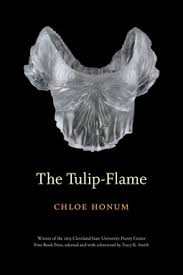 As in fairy tales — which often begin with an absent mother, a silent or silenced daughter — the world conjured in Chloe Honum’s marvelous The Tulip-Flame flickers with forces universal, primal, and claustrally familial. Most fairy stories, however, are not told by their young, imperiled protagonists, whose dramas, trials and lessons we receive instead through distancing mouthpieces —a fireside crone or Mother Goose figure, usually “speaking” in the third-person through a redactor/author, such as the Grimm brothers or Charles Perrault.
As in fairy tales — which often begin with an absent mother, a silent or silenced daughter — the world conjured in Chloe Honum’s marvelous The Tulip-Flame flickers with forces universal, primal, and claustrally familial. Most fairy stories, however, are not told by their young, imperiled protagonists, whose dramas, trials and lessons we receive instead through distancing mouthpieces —a fireside crone or Mother Goose figure, usually “speaking” in the third-person through a redactor/author, such as the Grimm brothers or Charles Perrault.
In Honum’s poems, the speaker is protagonist — by turns child, adolescent, young adult — whose mother has attempted and ultimately commits suicide. The realm the narrator inhabits is a welter of emotional trip-wires and consequences that she senses but often does not yet have adequate experience to interpret or articulate. The practice of ballet, a flirtation with anorexia, and the compensation of magical thinking are ways the narrator exerts control over the inchoate roil of her psychic sphere. The result is poetry of acute, hibernal insularity and watchfulness.
The collection opens with “Spring”:
Mother tried to take her life.
The icicles thawed.
The house, a wet coat
we couldn’t put back on.
Still, the garden quickened,
the fields were firm.
Birds flew from the woods’
fingertips. Among the petals
and sticks and browning fruit,
we sat in the grass and
bickered, chained daisies, prayed.
All that falls is caught. Unless
it doesn’t stop, like moonlight,
which has no pace to speak of,
falling through the cedar limbs,
falling through the rock.
 With reportorial elegance and subtly sophisticated figuration (that “wet coat” of the house, the “chained daisies”), Honum summons the children’s wariness. She acknowledges that although the world is beginning anew despite her family’s trauma, it is also true that now, for her, it will also always be fall. Hers is a precarious universe. Self-violence and abandonment are scenarios made all the more terrifying because they refuse to conform to the seasons, reason, wishing, volition, expectation, or even prayer.
With reportorial elegance and subtly sophisticated figuration (that “wet coat” of the house, the “chained daisies”), Honum summons the children’s wariness. She acknowledges that although the world is beginning anew despite her family’s trauma, it is also true that now, for her, it will also always be fall. Hers is a precarious universe. Self-violence and abandonment are scenarios made all the more terrifying because they refuse to conform to the seasons, reason, wishing, volition, expectation, or even prayer.
Dread has “no pace to speak of,” and giving it voice is a gift of this poem and the collection as a whole. Many of the poems occur in winter or have the feel of ice and snow about them. In stark, hushed, hungry scapes, the speaker narrates her disquietude, describing herself as smoke, mist, stone, eluded mirror. In the prose poem “Ballerina in Winter, ” Honum’s speaker says: “Sometimes I go outside to work on grand jetés, to run barefoot and push off from wet concrete while Mother and Sister sleep. They know that I am changing but not how quick. Sometimes the sky is violet above a jury of silver birds. Sometimes mist. Sometimes lightning slices the hills straight through and doesn’t hit a nerve.”
Children who lose their mothers are forced to mother themselves. Mistrust of the maternal and need for self-comfort lead Honum’s speaker to seek solace in carefully assembled notions of the cosmos. “When there’s a song in my head / where God should be,” says the narrator of “Danse des Petits Cygnes,” “I yearn for the ballet master, / for winters // at the studio where I / was one of four cygnets”:
Even seeing us together
in our white tutus —
like roses standing naked
on a coffin — I was soothed
by the sound of rain
hissing through the leaves.
Later losses — a friend’s death, an ended love affair — complicate and feed the tulip-flame of Honum’s childhood tale. In a poem about the remorse attending the ending of a relationship, what the speaker says about a clutch of leaves in the wind — “they swirl against my door / like words to a sentence, / out of order and burning” — suggests that although silence will always be her “mother tongue,” Honum acknowledges the sustained, sustaining flame that myth provides:
I have learned that to be in shock is a kind of mercy. I stayed there a long time. One winter, I was a preschool teacher. At recess, the children would pick things up and bring them to me as gifts. A pebble, a piece of bark, a dirty feather. Often a child would say, I got this for you. As in I have come back from a journey. As in I remembered. I learned the question who wants a story is always welcome. The days were short. It was snowing.
(“December”)
“What does it take / to see what darkness gives?” In the suffering and soul evinced in these lyrics resounds Honum’s stalwart, resilient answer.
[Published April 8, 2014.55 pages, $15.95 paperback. Recipient of the 2013 CSU Poetry Center First Book Prize]
Lisa Russ Spaar
is a professor of English and teaches creative writing at the University of Virginia. Vanitas, Rough (Persea, 2012) is her most recent collection of poems. She contributes a regular feature for The Los Angeles Review of Books called “Second Acts: A Second Look at Second Books of Poems.”
* * * * * * * * * * * * * * * * * * * * * * * * * * * * * * * * * * * * * * * * * * *
Katie Peterson
A Table That Goes On For Miles by Stefania Heim (Switchback Books)
This fall, if you lived in Boston, you could see a good number of French filmmaker Chris Marker’s movies at the Harvard Film Archive and the Kendall. Poets have a bad habit of claiming that any great artist is a poet but Marker is a poet. In 1963’s La Joli Mai, his cameras follow not the famous monuments of Paris but the ordinary people, street level. There’s a hollowness in their laughter. Of happiness, the narrator says, “One would like to track it like a detective …” The film begins by asking a shopkeeper when he feels free, to which he replies, almost never.
 In another old world city, the city of Venice, American poet Stefania Heim tracks time in a poem called “Serenissima”: “I had meant to catch the slant of dimming light, to keep track // while it fell and then feel reckless. Panic at the fish market. / Panic at the intersection of canal and street. I am more romantic // than they are. And more scared” (“Serenissima”). The existential terror here isn’t isolated – it’s surrounded. And it’s not that an inner life is difficult to maintain – it’s that it doesn’t exactly exist. “Posit me, engaged as I am in constant / miscommunication,” writes Heim in another poem. “In one / thought experiment all our hopes are made of words,” she writes in another. This poet doesn’t believe that when you finally get back to that little room of yourself in the hotel of your life, the grand tour of your existence, you will be alone.
In another old world city, the city of Venice, American poet Stefania Heim tracks time in a poem called “Serenissima”: “I had meant to catch the slant of dimming light, to keep track // while it fell and then feel reckless. Panic at the fish market. / Panic at the intersection of canal and street. I am more romantic // than they are. And more scared” (“Serenissima”). The existential terror here isn’t isolated – it’s surrounded. And it’s not that an inner life is difficult to maintain – it’s that it doesn’t exactly exist. “Posit me, engaged as I am in constant / miscommunication,” writes Heim in another poem. “In one / thought experiment all our hopes are made of words,” she writes in another. This poet doesn’t believe that when you finally get back to that little room of yourself in the hotel of your life, the grand tour of your existence, you will be alone.
This is a hard problem for poetry, which tends to be where we go to find our idealized inner lives. Stefania Heim’s A Table That Goes On For Miles has made me think differently — and hear differently – regarding this, and it’s a pleasure to do so. The quick movement of the poems reminds me of Robert Creeley, with abrupt turns on the line and striking silences. But I think of Creeley’s poems as monologues, and the signature lyric of this book, feel instead like a conversation, often about something seen or experienced that feels like a crime even if it isn’t. I’m thinking of one poem in particular with is bright transgression against the eye in the title, “A Large Mirror Unloaded From a Truck In the Sun.” One half of this conversation is personal, blunt: “I know / when I grovel I am plain.” The other half is abstract, trapped, depersonalized, prone to odd syntax, old-world gesture, feels translated as opposed to written: “Passion clusters as though circumstance.” In a beautiful poem about anticipating the birth of a daughter, Heim writes “Soon, / of a group, I’ll say: // one of those is mine. That one. / The pull and grieve of her / so far unimaginable.” The first voice keeps the poems immediate and the second pushes the poems towards the unimaginable – towards some horizon of thinking and feeling, what Italian-American Heim would call “want.”
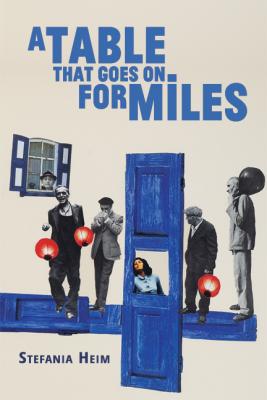 I’ve been talking about cities, but the book is much more like a village: Heim is interested in cultural gossip (the incredible collages of Rachael Farbiarz underscore this, their village images gone a bit haywire, and the book is dedicated to Heim’s mother’s hometown in Italy). A kind of intense game of telephone fuels one of the collection’s most memorable poems, “Considering the Limitations of the Force of My Will,” with that old-world word “want” getting turned over and over: “And how I do not, // can not, wanting, / know // the want of the thing / I want: // the what of it.” The best work in the book treat village subjects – memory, motherhood, marriage – with a new intensity and suspicion. A poem like “Against Shipwreck,” for example, reveals itself to be an epithalamion, but that ancient gesture is only possible as stutter: “Fumble // in the pocket for some / necessary stay. I want to // make big things fly. / Make them fall and break // irrevocably. Start seaward. / Make “marry” weigh.”
I’ve been talking about cities, but the book is much more like a village: Heim is interested in cultural gossip (the incredible collages of Rachael Farbiarz underscore this, their village images gone a bit haywire, and the book is dedicated to Heim’s mother’s hometown in Italy). A kind of intense game of telephone fuels one of the collection’s most memorable poems, “Considering the Limitations of the Force of My Will,” with that old-world word “want” getting turned over and over: “And how I do not, // can not, wanting, / know // the want of the thing / I want: // the what of it.” The best work in the book treat village subjects – memory, motherhood, marriage – with a new intensity and suspicion. A poem like “Against Shipwreck,” for example, reveals itself to be an epithalamion, but that ancient gesture is only possible as stutter: “Fumble // in the pocket for some / necessary stay. I want to // make big things fly. / Make them fall and break // irrevocably. Start seaward. / Make “marry” weigh.”
In a sense, the poems are trustworthy because the speaker can’t be trusted. Circumspect, she’s suspect. More often, she’s sinister, as in the poem “Birthing the Baby,” in which the frustrations of being seen as a mother and the frustrations of being seen as a poet come together with striking clarity, or the anti-confessional “Saturday and Getting Colder,” which begins: “Now you know / everything: I was unnaturally lit from within.” A Table that Goes On for Miles announces in its title, some dream of togetherness, communication, shared ritual – but its powerful sense of exposure is the dark engine of that want.
[Published March 19, 2014. $16.00 paperback. You can purchase a copy from the press by clicking here.]
Katie Peterson
is the author of three collections of poetry, This One Tree (New Issues, 2006), Permission (New Issues, 2013), and The Accounts (University of Chicago, 2013) which received the 2014 Rilke Prize from the University of North Texas.
* * * * * * * * * * * * * * * * * * * * * * * * * * * * * * * * * * * * * * * * * * * *
Zach Savich
Peace by Gillian Conoley (Omnidawn Publishing)
Gillian Conoley’s seventh collection of poetry, Peace, is richly attentive to history’s impact on daily perception. This attention makes mindfulness a type of witnessing. In “Monday Morning,” for example, Conoley considers race and privilege in an era that is “after the Civil Rights Movement” yet in which “nothing’s over.” She suggests that “if you can stay aware long enough / every morning // it is the morning you can try to live / as though it were morning” (Conoley’s lineation is singular; I have represented internal line spacings with slashes and line breaks with double slashes).
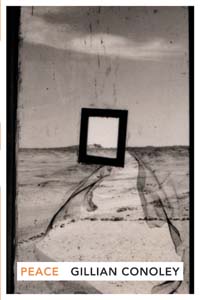 Throughout Peace, Conoley’s transformational awareness is at once ardent (“it is the morning”) and lucidly ambivalent (“try,” “as though”). “Beloved figures die // then stop and loop // to pixelate” into legends that can be formative yet simplistic, she suggests in “Trying to Write a Poem about Gandhi,” one of several poems that explores the difficulty of historical interpretation. (“Accept the body! // You pussy,” Conoley declares after invoking the idiosyncratically chaste Gandhi.) This combination of ardor and ambivalence reflects the civic condition of what one poem terms “late democracy”; similar to Late Antiquity, this stage encompasses both imminent catastrophe and lush calms. The poem’s reference to a “troll” does both: a troll is an online threat to “identity,” a troll is a figure from a shifting past, from a fantastic tale set in the “sweet secret green” of a meadow.
Throughout Peace, Conoley’s transformational awareness is at once ardent (“it is the morning”) and lucidly ambivalent (“try,” “as though”). “Beloved figures die // then stop and loop // to pixelate” into legends that can be formative yet simplistic, she suggests in “Trying to Write a Poem about Gandhi,” one of several poems that explores the difficulty of historical interpretation. (“Accept the body! // You pussy,” Conoley declares after invoking the idiosyncratically chaste Gandhi.) This combination of ardor and ambivalence reflects the civic condition of what one poem terms “late democracy”; similar to Late Antiquity, this stage encompasses both imminent catastrophe and lush calms. The poem’s reference to a “troll” does both: a troll is an online threat to “identity,” a troll is a figure from a shifting past, from a fantastic tale set in the “sweet secret green” of a meadow.
Conoley’s poems are receptive to history’s significance, not polemical about its politics; this receptivity is striking and intent. Conoley is as good as any writer I can think of at conveying stunned and present perception. “Just let me go out swilling whiskey in the hill country,” she writes in “late democracy,” a gesture that resembles many moments in her poetry: one feels stopped in one’s path by the completeness of a desire or observation, and so the path multiples, expands, races through the instance. “That’s my girl’s lost blue sweater hung on the fencepost,” Conoley writes, and I feel both the irreducible integrity of that image as an emblem — of parenting, fragility, our affection for the things of the world — and as an expansive instance that is removed from everything except perception itself.
Such remarkable clarity doesn’t merely illustrate the book’s historical consciousness but is inseparable from it, and I adore the luminous solidity of Conoley’s vision. It both preserves a live present and records its passing. Take this nuanced evocation of an instance, its subtle alternations in scale: “a bosomy female figure appears // behind the screen door // the smell of parrots // a ribbon falls // from my daughter’s hair // onto her plastic town.”
 If you are unfamiliar with Conoley’s work, I enthusiastically recommend her earlier books; Lovers in the Used World is one of my favorites, and its title comes to mind whenever I read her work. As in that book, Peace often integrates its elements — of historical awareness, of present perception — into landscapes that are both intimate and tensely defamiliarized: “everything was on sale / the pop music was under the heat lamps,” begins “Monday Morning.” Many poems in Peace catch this intimate defamiliarization in an elongated pause. “There is a lot of room for metaphysics / in this country // I call waiting,” Conoley writes. She enters this country further through several poems concerned with patience (“Patience’s gentle tongue was breaking a bone,” she writes).
If you are unfamiliar with Conoley’s work, I enthusiastically recommend her earlier books; Lovers in the Used World is one of my favorites, and its title comes to mind whenever I read her work. As in that book, Peace often integrates its elements — of historical awareness, of present perception — into landscapes that are both intimate and tensely defamiliarized: “everything was on sale / the pop music was under the heat lamps,” begins “Monday Morning.” Many poems in Peace catch this intimate defamiliarization in an elongated pause. “There is a lot of room for metaphysics / in this country // I call waiting,” Conoley writes. She enters this country further through several poems concerned with patience (“Patience’s gentle tongue was breaking a bone,” she writes).
This restive patience is most capacious and honed in the book’s long poems, such as “A Healing for Little Walter,” a notational dirge that reads like a wellspring and reorientation of the ballad, and its longer sequences, “Peace” and “Begins.” The latter concludes the book; it took me unusually long to read, because I found myself paused in extended reflection (a kind of induced patience? a way to “stay aware long enough?”) after many of its lines. It also took me unusually long to stop reading: though I typically read quickly, perhaps too quickly, I found myself carrying Peace with me for weeks, revisiting sections of “Begins” such as this one:
Kandinsky said an object was a narrative
and so he disapproved of it
de Kooning said you are with a group or movement
because you cannot help it
I just wanted a church we could go to
or stand in front of and beg
to allow something to remain potential
so the eyes wouldn’t hate their little dictators
I have since recommended Peace to many friends, and I am pleased to recommend it here. It is “topical” in the sense of a salve—it works on and across surfaces, which include one’s human days, as well as the multi-dimensional scape of the page—and as consequential as quickly changing weather. Throughout Peace, Conoley allows a good deal to “remain potential,” which helps the eye look steadily at what is here, at what might be.
[Published April 1, 2014. 112 pages, $17.95 paperback]
Zach Savich
is the author of four collections of poetry, including Century Swept Brutal (Black Ocean, 2014). He teaches at the University of the Arts in Philadelphia.
* * * * * * * * * * * * * * * * * * * * * * * * * * * * * * * * * * * * * * * * * *
David Wojahn
Collected Poems by Ron Padgett (Coffee House Press)
Even for readers of poetry (and of course, readers of poetry who are not also poets themselves can be counted on your fingers), phonebook-sized collected volumes can seem a bit daunting. Several of such books have landed on my desk recently, often coming as review copies. Publishers send these legacy books out with a fair degree of largesse, for they stand a better chance than other collections of winning a major award. These books form a pile that reaches my waist — Collecteds by Louise Glück (634 pages ), Derek Walcott (617 pages), Charles Wright (only 387 pages, but this is his fourth Collected, covering only his most recent work), Geoffrey Hill (973 pages), and the biggest of all these poetic Big Macs, the Library of America’s two-volume Collected of W.S. Merwin (1,500 pages). I am happy to own these collections, and a couple of them I have even read, although sometimes out of a sense of duty as much as with pleasure. Yet I can say with a high degree of certainty that Ron Padgett’s Collected Poems, which has now caused this teetering pile to reach my chest, is the only one of the volumes on this august heap that is unabashed fun to read.
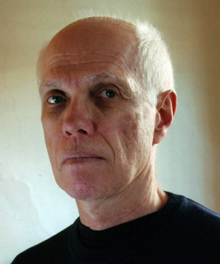 Mind you, to say that a poet is fun to read can seem like damning with faint praise: Kenneth Koch, whose emotional range and command of technique was ultimately as great as that of any poet in his generation, was seen by far too many critics and reviewers as “merely” a comic poet, a slightly more hip and photogenic Ogden Nash. One of the more exasperating legacies of a certain kind of modernism, and a view that holds some sway even now, is that real poetry must be high-toned, difficult, and arcane. For example, even the explanatory notes to the poems in Hill’s recent Collected seem a little bit scary. We are told that one of the poems is inspired by “John Colet’s marginalia to the Epistolae of Marsilio Ficinio, as transcribed by Sears-Jayne, John Colet and Marsilio Ficinbo (Oxford, 1963).” This sort of pedantry derives in no small measure from Eliot’s criticism, which has never really lost its cachet. (I’m talking here of the public Eliot, not the Eliot who carried on a long-standing correspondence with Groucho Marx, and whose posthumously unpublished “King Bolo” doggerel manages to rhyme “jungle” with “bung-hole.”) At any rate, let me proceed from the notion that to characterize Ron Padgett as fun to read — and consistently fun to read even in a behemoth Collected — is a form of high praise, not a caveat. And let me also emphasize that Padgett is a poet whose best work, like that of Koch, combines hijinks with pathos, absurdism with a deeply elegiac sensibility, experimentalism with a big-hearted generosity of spirit, and immediacy with a vast but easy-going comprehension of literary tradition. Of the second generation of New York School Poets, no one save for the possible exception of Ted Berrigan has created such a substantial and various body of writing. The conventional wisdom has it that the second wave of New York School poets, ensorcelled as they were by Ashbery, Koch, and O’Hara, were largely imitators rather than innovators. But Padgett is by no means a Frank Sinatra, Jr. Matched against his chosen mentors, he more than holds his own.
Mind you, to say that a poet is fun to read can seem like damning with faint praise: Kenneth Koch, whose emotional range and command of technique was ultimately as great as that of any poet in his generation, was seen by far too many critics and reviewers as “merely” a comic poet, a slightly more hip and photogenic Ogden Nash. One of the more exasperating legacies of a certain kind of modernism, and a view that holds some sway even now, is that real poetry must be high-toned, difficult, and arcane. For example, even the explanatory notes to the poems in Hill’s recent Collected seem a little bit scary. We are told that one of the poems is inspired by “John Colet’s marginalia to the Epistolae of Marsilio Ficinio, as transcribed by Sears-Jayne, John Colet and Marsilio Ficinbo (Oxford, 1963).” This sort of pedantry derives in no small measure from Eliot’s criticism, which has never really lost its cachet. (I’m talking here of the public Eliot, not the Eliot who carried on a long-standing correspondence with Groucho Marx, and whose posthumously unpublished “King Bolo” doggerel manages to rhyme “jungle” with “bung-hole.”) At any rate, let me proceed from the notion that to characterize Ron Padgett as fun to read — and consistently fun to read even in a behemoth Collected — is a form of high praise, not a caveat. And let me also emphasize that Padgett is a poet whose best work, like that of Koch, combines hijinks with pathos, absurdism with a deeply elegiac sensibility, experimentalism with a big-hearted generosity of spirit, and immediacy with a vast but easy-going comprehension of literary tradition. Of the second generation of New York School Poets, no one save for the possible exception of Ted Berrigan has created such a substantial and various body of writing. The conventional wisdom has it that the second wave of New York School poets, ensorcelled as they were by Ashbery, Koch, and O’Hara, were largely imitators rather than innovators. But Padgett is by no means a Frank Sinatra, Jr. Matched against his chosen mentors, he more than holds his own.
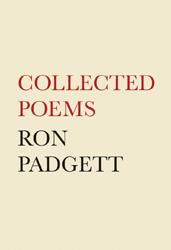 Like so many of the other poets of the New York School, Padgett made his way to the City from the sticks. In his case, as with his lifelong friend Joe Brainard, the hometown he escaped from was Tulsa, and his poems often evoke his Oklahoma upbringing with a wry nostalgia. (He does this especially well in “Wilson,” a hilariously deadpan account of this high school years.) The sense of awestruck wonder at the delights of the urban life that must have accompanied Padgett’s arrival at Columbia in 1960 seems never to have left him. Many of his poems are in the mode of what has come to be called the urban pastoral, employing the method O’Hara perfected in Lunch Poems — and poems in this manner are in fact immensely hard to write, O’Hara’s many imitators notwithstanding. There’s a laid-back cosmopolitanism to his work that makes Padgett not only a trustworthy tour guide to Big Apple culture, but which also allows his antic experimentalism — much of it deriving from the avant gardist French poets whom he has translated — to seem playful rather than effete.
Like so many of the other poets of the New York School, Padgett made his way to the City from the sticks. In his case, as with his lifelong friend Joe Brainard, the hometown he escaped from was Tulsa, and his poems often evoke his Oklahoma upbringing with a wry nostalgia. (He does this especially well in “Wilson,” a hilariously deadpan account of this high school years.) The sense of awestruck wonder at the delights of the urban life that must have accompanied Padgett’s arrival at Columbia in 1960 seems never to have left him. Many of his poems are in the mode of what has come to be called the urban pastoral, employing the method O’Hara perfected in Lunch Poems — and poems in this manner are in fact immensely hard to write, O’Hara’s many imitators notwithstanding. There’s a laid-back cosmopolitanism to his work that makes Padgett not only a trustworthy tour guide to Big Apple culture, but which also allows his antic experimentalism — much of it deriving from the avant gardist French poets whom he has translated — to seem playful rather than effete.
In the manner of so many of his fellow New York Schoolers, Padgett is wary of drawing any grand distinction between reports of quotidian events and subjects of Large Import, and he loves pop culture and high culture with equal fervor. (There’s a poem entitled “Reading Proust, but in the book you’ll also find what is probably the only ode ever composed to Roy Rogers’ crotchety sidekick, Gabby Hayes.) And it is not for nothing that one of Padgett’s longest poems is a set of instructions, not all of them tongue-in-cheek, entitled “How to be Perfect,” for he seems to be one of the few poets on the planet who has no need for Prozac, Welbutrin, Paxil, or Zoloft. Yet this does not mean that the poems are coyly or naively celebratory. As he writes in a little poem entitled “Song,” an ars poetica of the sort that appears quite frequently in his work, “Learning to write, / be a good person and get to heaven / are all the same thing, // but trying to do them all at once/ is enough to drive you crazy.” This, by the way, is the poem in its entirety.
 One of the principal delights of reading a large Collected straight through is witnessing the narrative arc of a poet’s career. Derivative early work gets followed by a transition to an individual voice; that voice starts to speak with greater modulation and authority — and sometimes stumbles into self-imitation. In rarer instances, we see a new and grander poetic empowerment in the very late work (think of the great elegies for his wife that Hardy composed in his seventies, or the work of Yeats’ final decade). In Padgett’s case, this pattern is more muted than overtly dramatic, but it is certainly there. The early books are dutifully Dadaist: 1964’s In Advance of the Broken Arm, cops its title from Duchamp’s famous readymade of a snow shovel, and 1969’s Great Balls of Fire has perhaps a few too many poems that borrow their chops from early Ashbery, both the loopy pedantry of poems such as “Instruction Manual” and the collagist pieces in The Tennis Court Oath. Padgett’s Dada-derived phase is best represented by Bean Spasms, a book length effort which he co-wrote with Ted Berrigan. (Padgett omitted this and other collaborative efforts from the Collected, but you can find it in Berrigan’s 2005 Collected Poems.) It’s with 1976’s Toujours L’ Amour that Padgett really comes into his own; the writing from this point on the writing is remarkably consistent, and even his throwaway poems, pieces with titles such as “My Spinach” and “Bad O’Hara Imitation” have a certain élan. He seems incapable of writing a dull poem. This is even the case in a collection which is cheekily entitled Poems I Guess I Wrote — outtakes cribbed from notebooks and folders going back many decades and which the poet claims to “have no memory, or at most a tiny inkling of a memory, of having written.”
One of the principal delights of reading a large Collected straight through is witnessing the narrative arc of a poet’s career. Derivative early work gets followed by a transition to an individual voice; that voice starts to speak with greater modulation and authority — and sometimes stumbles into self-imitation. In rarer instances, we see a new and grander poetic empowerment in the very late work (think of the great elegies for his wife that Hardy composed in his seventies, or the work of Yeats’ final decade). In Padgett’s case, this pattern is more muted than overtly dramatic, but it is certainly there. The early books are dutifully Dadaist: 1964’s In Advance of the Broken Arm, cops its title from Duchamp’s famous readymade of a snow shovel, and 1969’s Great Balls of Fire has perhaps a few too many poems that borrow their chops from early Ashbery, both the loopy pedantry of poems such as “Instruction Manual” and the collagist pieces in The Tennis Court Oath. Padgett’s Dada-derived phase is best represented by Bean Spasms, a book length effort which he co-wrote with Ted Berrigan. (Padgett omitted this and other collaborative efforts from the Collected, but you can find it in Berrigan’s 2005 Collected Poems.) It’s with 1976’s Toujours L’ Amour that Padgett really comes into his own; the writing from this point on the writing is remarkably consistent, and even his throwaway poems, pieces with titles such as “My Spinach” and “Bad O’Hara Imitation” have a certain élan. He seems incapable of writing a dull poem. This is even the case in a collection which is cheekily entitled Poems I Guess I Wrote — outtakes cribbed from notebooks and folders going back many decades and which the poet claims to “have no memory, or at most a tiny inkling of a memory, of having written.”
Padgett is in his seventies now, and it is not surprising that the poems he has written since his 2002 volume, You Never Know, have started to admit the decidedly un-Padgett-y themes of aging and mortality. The poems are no less inventive, the jokes no less amusing, but there’s a bittersweet edge to the writing that brings to mind the elderly Groucho saying that his fondest hope was to be “buried next to a straight man.” The first line of a poem entitled “Death” reads, “Let’s change the subject.” Consider a little poem called “Boxing Day”:
Everything starts as a box
inside of which is you
don’t know what. And
every time you open it, it
is something else. Today,
an island, tomorrow a toy island.
But those palm trees are unsatisfactory.
Take them back to the factory!
I open the box to release the men
Who will bring me a new island.
But that’s tomorrow. So I’m grumpy.
I’m in a grumpy box. Is there
anyone out there who
will take me out? No. Because
they don’t know I’m in here,
and I won’t tell them. I don’t
want them to take me back to the factory.
I would be remiss if I didn’t also mention the various elegies which Padgett has composed for Ted Berrigan and Joe Brainard. Heartfelt but unsentimental, “Listening to Joe Read” is perhaps the best of them, and manages to eulogize both poets at once:
I’m reminded that what made him great
was not that he was a great reader (he wasn’t)
but that he was Joe: “History.
What with history piling up so fast,
almost every day is the anniversary
of something awful” Was Ted
in the audience at the Ear Inn
in 1983? I think I hear his chortle.
Joe’s voice in my ear and his ashes
up in the meadow now dark, it’s night.
I have plenty of time to say all this,
as long as Joe has time on this tape to read
as many times as I want to play it,
as if he’s here, as of course he is,
inside this little brain,
its wheels turning round and round.
Big Collecteds tend to be the poetic equivalents of cenotaphs and mausoleums, a variety of funerary art, even when honoring a writer still very much alive. Ron Padgett’s Collected is a work of a different order: he has as left us not the pyramid of Khufu, but instead a monumental fun house. And I think we’ll be exploring its marvels and oddball corridors for a good long while.
[Published November 5, 2013. 810 pages, $44.00 hardcover]
David Wojahn’s
most recent collection, World Tree, was published by the University of Pittsburgh Press in 2011, and was the recipient of the Academy of American Poets’ Lenore Marshall Prize. A book of criticism, From the Valley of Making, will be published by the University of Michigan Press in 2015. He teaches at Virginia Commonwealth University.
* * * * * * * * * * * * * * * * * * * * * * * * * * * * * * * * * * * * * * * * * * *
Elaine Sexton
Chopper! Chopper! Poetry From Bordered Lives by Veronica Reyes (Arktoi Books, an imprint of Red Hen Press)
Veronica Reyes’ debut collection of poetry and prose reads like a graphic novel, an edgy ride through her East Los Angeles, where “the evening comes shrouding the city / a wrinkled blue latex twilight.” In her introduction, Reyes gives a name to her desire to cross borders, offering the term “scripted poetry,” mixing genres as freely as she does languages. The result is a sometimes lineated ride, chock-full of vivid sensual delights. The poet cultivates words and expressions, deploying them in a way that often seem to leave them to sway on the page. She adopts a Chicana vernacular, readily mixing parts of speech, adjectives and nouns, Spanish, English, and a sonic slang, with lines like “Back when I was a little chamaca o mocosa …” and, when describing “a cafecito man, really un joven, working en el rancho branding vaca.” A reader will enjoy rolling the words around in their mind’s mouth, whether or not the expressions or words are familiar.
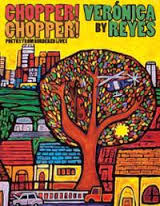 The compelling cover of Chopper! Chopper! is a cartoon-cityscape of East L.A. by Jose Ramirez, commissioned for this book, a wonderful point of entry, contributing to the deceptively light-hearted tone. This naïve backdrop is a perfect fit for the speaker’s escapades, some amusing, some dark. Reyes deals head on with complicated subjects of race, gender, and identity politics with humor, sensitivity, and irony. One example of her balancing of levity and gravity is the title poem where children play hide and seek, in and out of the giant spotlight cast from police helicopters buzzing overhead: “Little feet darted, scurried down the loma away from the big dog that was chasing them.”
The compelling cover of Chopper! Chopper! is a cartoon-cityscape of East L.A. by Jose Ramirez, commissioned for this book, a wonderful point of entry, contributing to the deceptively light-hearted tone. This naïve backdrop is a perfect fit for the speaker’s escapades, some amusing, some dark. Reyes deals head on with complicated subjects of race, gender, and identity politics with humor, sensitivity, and irony. One example of her balancing of levity and gravity is the title poem where children play hide and seek, in and out of the giant spotlight cast from police helicopters buzzing overhead: “Little feet darted, scurried down the loma away from the big dog that was chasing them.”
These poems tell stories, and many are simply stories in prose: earnest, matter-of-fact portraits of lives where gunshots are common enough for the inhabitants to readily identify their proximity and location by sound. Reyes is eager to share the climate of her experiences growing up gay in a district that is over 90% Latino, policed by helicopters, in a family where competing with her siblings to collect the most cans for cash is also a game. Her music and structure spin, frankly, as in the first six lines of a poem, “Torcidaness: Tortillas and me”:
You know, a homemade tortilla de maíz when you see it
All crooked, lopsided and torcida like queer Silver Lake
Ya sabes, que it ain’t round and curved like una pelota
Ya sabes, que it ain’t no flying saucer like at Roswell
Tú sabes, homegirl, esta pura chueca like the owner
/span>
 In this poem, the child who has been sent to buy tortillas loses them on the long walk home when the bag she is carrying breaks. The tortillas go flying and she fears: “My mama was going to whip my little brown nalga with the cinto.” There is a rescue. The journey is rich in detail, but the adventures of this young “jota” who takes off from the store, “like a dirty shirt,” may leave some readers wanting more than the curious surface of her story.
In this poem, the child who has been sent to buy tortillas loses them on the long walk home when the bag she is carrying breaks. The tortillas go flying and she fears: “My mama was going to whip my little brown nalga with the cinto.” There is a rescue. The journey is rich in detail, but the adventures of this young “jota” who takes off from the store, “like a dirty shirt,” may leave some readers wanting more than the curious surface of her story.
The work in this collection takes a little getting used to. Like the poetry equivalent of cinema verité, Reyes, as director, lets the action wind its way with little or no mining of material for meaning. I often felt the need to suspend a search for subtext in order to simply enjoy what was there to enjoy: the gorgeous details, luscious language, letting the moving experiences wash over me. The pleasures in this book are direct, in the moment, to be savored, as in the elegant opening of “Trockas,” about Mexican workers:
Each angel city morning, golden or charcoal painted sky
clusters of them, like tender nopales, break the day open
They travel winding city-smog roads heading to the spot
They travel in threes or fours and sometimes solitary
They so desperately want to blend in with the people
The local born Mexicans who straddle the river, the city
But they look like pesetas, not pennies tossed out
This is a collection full of swagger, with some great send-ups like “Super Queer,” after Curtis Mayfield’s “Super Fly,” and other less successful poems, like “This is My Angela Davis Poem,” about Reyes not going to hear Davis read on the San Diego State University campus when she was a student there. The work is most appealing when the poet doesn’t step in and try to explain why she writes what she writes. This collection is, itself, an excellent invitation to consider this question, and to look for what this writer is going to say next.
[Published October 1, 2013. 112 pages, $18.95 paperback]
Elaine Sexton
is the author of two collections of poetry, Causeway and Sleuth, both with New Issues. She lives in New York where she works as an editor at ARTnews.
* * * * * * * * * * * * * * * * * * * * * * * * * * * * * * * * * * * * * * * * * * * *
Chloe Honum
The Consolations by John W. Evans (Trio House Press)
 In The Consolations, John W. Evans guides the reader through a fiercely intimate journey of grief and love. The book is divided into three titled sections: “Months,” “The Consolations,” and “Years.” Each poem in “Months” includes an epigraph marking the time that has passed since the death of the speaker’s wife, Katie. These temporal tags ground and inform the poems in unexpected ways. Take, for example, “There Are No Words / Six Weeks.” At first glance, the epigraph appears to support the title: so close to a tragedy, words seem insubstantial. Yet the poem, and by extension the book itself, refutes this idea:
In The Consolations, John W. Evans guides the reader through a fiercely intimate journey of grief and love. The book is divided into three titled sections: “Months,” “The Consolations,” and “Years.” Each poem in “Months” includes an epigraph marking the time that has passed since the death of the speaker’s wife, Katie. These temporal tags ground and inform the poems in unexpected ways. Take, for example, “There Are No Words / Six Weeks.” At first glance, the epigraph appears to support the title: so close to a tragedy, words seem insubstantial. Yet the poem, and by extension the book itself, refutes this idea:
The week of your funeral,
a poet wrote to tell me, There are no words,
and I thought, Isn’t that your job? Don’t you spend all day
finding words for situations, fascinations, strangers? Poems for the dead
are called elegies. The best elegies rattle around anthologies
like lost guitar picks, suggesting a kind of music
they will never play again.
Here, with the gorgeous likening of elegies to “lost guitar picks,” Evans proves his commitment as a poet: he will find the words. This tenacious stance is part of what makes The Consolations so electric.
Many of the poems directly address the speaker’s wife, who died when she was mauled by a brown bear in the mountains near Bucharest. The speaker tells Katie familial anecdotes: “Your nephew / and I registered online for an animatronic vulture.” He asks her achingly spiritual questions: “What tends a flame or the space around a flower? / What lifts blossoms from reeds without perpetuating grief?” Without melodrama, these poems depict the pining that lies at the heart of grief.
In its elegiac and passionate urgency, Evans’s voice at times reminds me of Jack Gilbert’s. Evans’s poem “Almanac / Ten Months,” for example, brims with rapturous proposals:
Let’s fall in love again. Let’s travel again. Let’s make ourselves uncertain
with the prospects of a new city
again, fly down the freeway to South Florida
or on someone else’s dime to South Asia or Eastern Europe again,
make a home for the year somewhere unknown again—
Let’s live where the rivers flood the cities every spring again,
or behind the park with the empty lake
boats tied down in the channel for the fall again —
 Evans is not interested in bitterness or in drawing sinister landscapes. From the mountains of Romania to the streets of the American Midwest, he renders the physical world with a kind of reverence. Like Gilbert, Evans is interested in mystery and magnitude; he explores sorrow with openness, searching for meaning rather than resolution. In the title poem, Evans writes:
Evans is not interested in bitterness or in drawing sinister landscapes. From the mountains of Romania to the streets of the American Midwest, he renders the physical world with a kind of reverence. Like Gilbert, Evans is interested in mystery and magnitude; he explores sorrow with openness, searching for meaning rather than resolution. In the title poem, Evans writes:
Where two mountains ascend in opposite directions from the earth
a valley is named Consolation.
Every spring, between rainfalls, bears
lumber from hibernation through the desolate wilderness
and toward a valley. From one side of the river
I imagine calling out at the night’s end.
Do I mean still to warn myself?
In the second half of the book, the speaker remarries and has a son. But this is by no means a simple process: “I married again. It felt like committing the very end / of a crime everyone was watching. When my son was born I thought, / The beginning of a family exceeds a marriage’s end. / I was lying to myself.” The final poem, however, is undeniably hopeful. The speaker tells Katie:
I love this life after you
like a stranger arriving late to his own surprise party, stubborn
with disbelief, eager to make up lost time,
each year thinking, love more,
whatever the deceit, however obvious or cowardly or sad
I claim the affection. This beautiful spring city.
The Consolations is a beautiful and exciting collection. Evans harnesses a great power of poetry: in the face of the unspeakable, he finds the words.
[Published January 6, 2014. 96 pages, $16.00 paperback]
Chloe Honum
is the author of The Tulip-Flame, selected by Tracy K. Smith as winner of the 2013 Cleveland State University Poetry Center First Book Prize. Her poems have appeared in The Paris Review, Poetry, The Southern Review, and elsewhere.
* * * * * * * * * * * * * * * * * * * * * * * * * * * * * * * * * * * * * * * * * *
Leah Umansky
Into the Dark & Emptying Field by Rachel McKibbens (Small Doggies Press)
 Someone once asked me whom my favorite poets are, and I named them. Then, I laughed. The work of each named poet couldn’t have been more different from my own. Then, I realized something. Sometimes what we are most drawn to in the writing of others is the fact that it is not like our own writing. Perhaps we wish we could write like these other writers; perhaps we wish we could be as witty as they are, or as skilled at line breaks or wordplay. But regardless, I think what we truly admire in the work of others, we bring with us, in our own ways, to our own writing. Ever since I heard Rachel McKibbens read at the Dodge Poetry Festival in the fall of 2013, I’ve been head over heels. I would’ve followed her into any poem’s story, any poem’s life. When I heard she had a second book coming out, I eagerly awaited it.
Someone once asked me whom my favorite poets are, and I named them. Then, I laughed. The work of each named poet couldn’t have been more different from my own. Then, I realized something. Sometimes what we are most drawn to in the writing of others is the fact that it is not like our own writing. Perhaps we wish we could write like these other writers; perhaps we wish we could be as witty as they are, or as skilled at line breaks or wordplay. But regardless, I think what we truly admire in the work of others, we bring with us, in our own ways, to our own writing. Ever since I heard Rachel McKibbens read at the Dodge Poetry Festival in the fall of 2013, I’ve been head over heels. I would’ve followed her into any poem’s story, any poem’s life. When I heard she had a second book coming out, I eagerly awaited it.
In an interview I conducted with her earlier this year for Tin House, she said, “My life has always been a fairytale. More Grimm than Mother Goose.” One can see this in her newest collection of poems, Into the Dark & Emptying Field. This is her second book, and the poems are indeed more Grimm than Mother Goose. The voices border on spectral at times, and the reader discovers poems that are part mother, part child, part woman, part bestial, part good and part evil. When I read Rachel McKibbens’ poems, not only am I fascinated, but I’m also slightly envious, like a greedy poet-stepsister. I’m also a little scared. That’s okay. Poetry is supposed to make you feel. It’s an experience.
These poems make the reader think about the relationships we have in our own lives; the stories we tell ourselves; and the secrets we hold at the back of our throats that fight for release. Mckibbens’ poems fight themselves and they make the reader watch. Inside the fierceness and bravery is a kind and nurturing voice, but the reader must go with the speaker on each journey, picking up each breadcrumb as it falls. Below, here’s “In the Town of Unchildren”:
Small bodies drop like forks.
Someone left the windows open again.
Spokes of a ribcage, gleaming.
Young skin splits like old cloth
pulled at the edges.
So much hair in the trees,
a bright red bow dangles
from an empty branch.
Tricycles in the river;
bonnets in the sewer.
A little shoe waits
in the ashes
of a lemonade stand.
A scorched bird howls:
Look at what you’ve done.
We all know these stories, or sometimes, nightmares. Every story is another story, but in Into the Dark & Emptying Field, somehow these stories are new again. They are revamped. There are echoes of our fears and our dreams, and of course longing. McKibbens says it as it is. There are no pretenses, and that’s the beauty here. You take it, or you leave it. Her words are at times like cautionary tales.
SIRENS
I came to the field
where last I fed
your flesh to stones, before
the boys spooned you out
and the river pinned you down.
Teeth to teeth, mud to mud.
I found a blue child, face down
in the grass. Her skin
unimpressed by sun.
a hot sound moved
through her –forgiveness, ticking.
I meant to shovel her from the earth
but she cracked like a milk plate.
I am a troubled woman, I am forgetful.
I recall nothing of your voice.
Only your smile that danced
like static each time you spoke.
The blood wind lifting your face
when I’d press. Now
there is dirt on everyone.
A house of dark confessions
hived beneath our fur.
Doesn’t that make your hair stand on end? That’s what poetry should do.
[Published May 28, 2013. 100 pages, $14.95 paperback]
Leah Umansky
is the author of the “Mad Men” inspired chapbook, Don Dreams and I Dream (Kattywompus Press, 2014) and a full-length collection, Domestic Uncertainties (BlazeVOX, 2013).